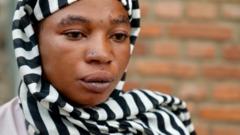Recent suicides highlight systemic failures in healthcare that burden those meant to heal.
**Tragic Trend: Rising Suicides Among Kenyan Medical Interns Lead to Calls for Reform**

**Tragic Trend: Rising Suicides Among Kenyan Medical Interns Lead to Calls for Reform**
As trainee doctors in Kenya face unbearable stress, families mourn the loss of young lives, urging government action.
A wave of grief has swept across Kenya's healthcare community as the tragic deaths of trainee doctors prompt urgent discussions about mental health and government support. Last week, medical interns attended the emotional burial of 29-year-old Francis Njuki, who took his life after struggling with depression exacerbated by the non-payment of his internship salary since August. Family members reported that the four-month salary delay severely impacted Njuki's mental health, ultimately leading him to end his life.
Njuki's case is sadly not an isolated incident; he is the fifth medical professional in Kenya to die by suicide in just two months, according to Dr. Davji Atellah of the Kenya Medical Practitioners and Dentists Union (KMPDU). The KMPDU has also noted five attempted suicides among their members this year, indicating a deepening crisis in the medical community.
Despite the vital role that interns play — comprising roughly 30% of the medical workforce in public hospitals — many are struggling to survive financially. With salaries delayed and insufficient support, these young practitioners face overwhelming stress as they provide essential care to patients. In Njuki's case, the burden of rent, bills, and lack of responsive insurance played significant roles in his tragic end.
The government has been entangled in disputes over intern salaries and working conditions, with proposed cuts to their pay sparking outrage among medical professionals. President William Ruto has maintained that the government must live within its financial means, which has created a rift between the administration and health workers. Recently, a long-awaited disbursement of funds was made, allowing the government to partially address the salary backlog for over 1,200 interns, but many reported feeling underappreciated and underpaid.
Salaries for interns have long been a contentious issue, with KMPDU advocating to maintain the monthly rate at $1,600, as previously agreed in 2017. The current proposal to lower it to $540 further exacerbates anxiety among young doctors who feel their contributions are undervalued.
Nyuki's tragic death follows that of Dr. Timothy Riungu, a 35-year-old pediatrician whose exhaustion led to his collapse after a rigorous work shift. Reports suggest Riungu had not taken leave in two years, and his death from hypoglycaemia serves as a stark warning about the mental and physical toll of the profession.
The KMPDU has reacted vehemently to these deaths, ordering interns to refrain from work unless the government addresses their grievances. Recent suicides, including that of Dr. Desree Moraa Obwogi, illustrate the dire consequences of unaddressed mental health challenges. Her family demanded accountability from the government during her funeral.
The hashtag #PayMedicalInterns has emerged as a rallying cry on social media, with countless young doctors pushing for recognition of their rights and the challenges faced in their profession. Health Minister Deborah Barasa acknowledged these tragedies as a call to action, promising implementation of mental wellness programs to support medical personnel's often overlooked psychological needs.
The heartbreaking reality is that many aspiring doctors are at risk of burnout and moral injury, feeling guilt for perceived failures in patient care under impossible conditions. Without comprehensive reforms, the cycle of despair may continue, leading to more lives lost within a system meant to nurture life.
In Kenya, around 1,400 suicides are recorded each year, and many believe the true figure to be much higher, made worse by the criminalization of suicide attempts. The stigmatization surrounding mental health in the country obstructs many from seeking help, leaving professionals like Njuki and his peers in a vulnerable position. The urgent need for systemic change in Kenya’s healthcare sector is evident, and the time for action is now.





















